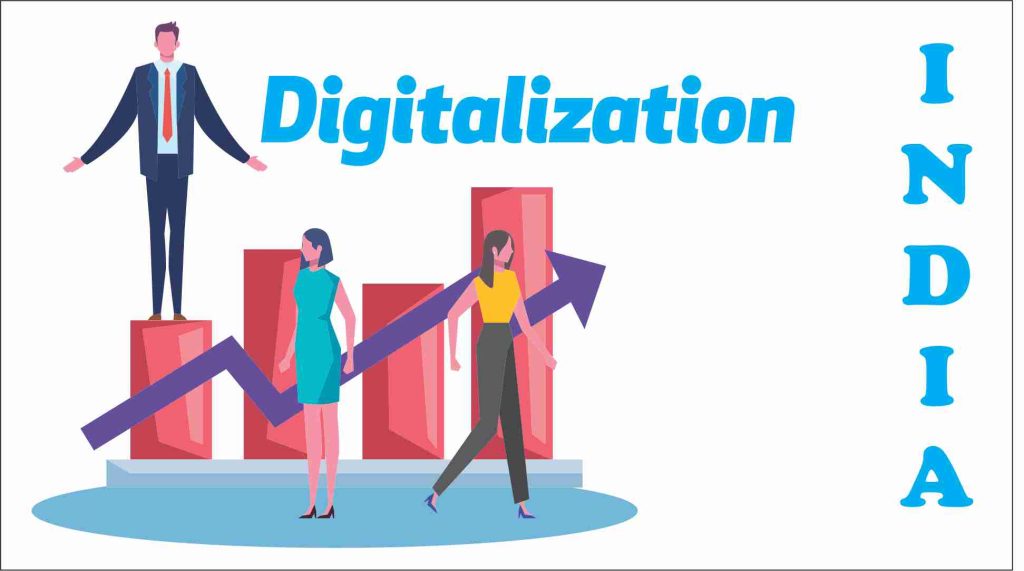Digitalization is the new hype of Indian right now. Everyone is talking about digital business or applying digital techniques to their business. Recently, Siddharth Mehta IL&FS Former Director and currently Founder and CIO of Bay Capital believes that “Businesses will need to think ‘digital’ if they are to compete and grow over the next decade”.
 Digitalization is the transformation of a business model using digital technologies in order to increase revenue and value-added opportunities. It is the transition to a digital business model. It encompasses the capability of digital technology to gather data, spot trends, and make more informed business decisions as well as the process of converting outdated business models to new technologies.
Digitalization is the transformation of a business model using digital technologies in order to increase revenue and value-added opportunities. It is the transition to a digital business model. It encompasses the capability of digital technology to gather data, spot trends, and make more informed business decisions as well as the process of converting outdated business models to new technologies.
The introduction of digitization will boost your company’s productivity and efficiency. The cloud, mobile devices, big data, and analytics are some of the new developing technologies that may aid organizations in increasing productivity and efficiency. Additionally, some businesses are automating and streamlining data-intensive jobs and business processes using AI and machine learning. According to Fortune Corporate Insights, 2020, 80% of business leaders say they would implement AI technology between 2020 and 2027, which will lead to major development in the retail sector. Additionally, 40% of organizations employ the digital paradigm to boost productivity.

As Siddharth Mehta Bay Capital applaud Indian government for enforcing digital platform to the public amid pandemic. We can say the outbreak of coronavirus also helped Indian to adapt digital platform in such a short period. The new digitally transformed India growing rapidly and making its own path towards the new era. The new digital era needs a new paradigm to run your business and digital transformation can be a suitable platform.
This blog is all about the benefits Digital transformation will provide to your business to run your business smoothly and for a long time.
A higher level of efficiency and productivity Improved resource management The ability to be resilient and agile A stronger digital presence Customer engagement has been improved Business needs are better met as a result of increased responsiveness A greater sense of innovation, creativity, and collaboration Time-to-market is faster Increased revenue potential Intensification of transparency and visibility
There are several advantages of digitalization that may be used by companies of all sizes. By utilizing digital technology, businesses may become more efficient, more profitable, and more competitive. However, businesses must have a clear plan and make sure that all staff are on board with the changes in order to truly profit from digitization.
“Adopting digital transformation within an organization is not an easy task. It will take time and a lot of patience to implement and receive benefits from it.” Benefits like cost savings, increased sales, and also increased new revenue. You will be amazed to know that digitalization is also helpful for businesses to compete” says Siddharth Mehta Bay Capital. Adding to his words he says, “Before purchasing a good or service, a lot of individuals conduct internet research. Your rivals will gain sales from you if you are not present in the digital realm”.




 Darren Huston is the founder and CEO of BlackPines Capital Partners which is a private investment firm.
Darren Huston is the founder and CEO of BlackPines Capital Partners which is a private investment firm. So what about cloud services then? Well, cloud computing is indispensable – the ability to process, and store data off-site has elevated the medium of computing and technology in general, through the roof! One might avail of the benefits of a higher spec device, simply through remote access. Cloud services, however, are not for everyone – sure, you can develop apps, and engineer AI, but rarely can you ever own cloud-based service. The cost of operations for Cloud Computing is simply staggering. This has led to the accumulation of the available cloud, within the hands of a few usual suspects – e.g. Amazon, Microsoft, Google, IBM, and the like.
So what about cloud services then? Well, cloud computing is indispensable – the ability to process, and store data off-site has elevated the medium of computing and technology in general, through the roof! One might avail of the benefits of a higher spec device, simply through remote access. Cloud services, however, are not for everyone – sure, you can develop apps, and engineer AI, but rarely can you ever own cloud-based service. The cost of operations for Cloud Computing is simply staggering. This has led to the accumulation of the available cloud, within the hands of a few usual suspects – e.g. Amazon, Microsoft, Google, IBM, and the like. Platform Engineer.ai, which allows anyone to create apps and software without knowing the code, announced today that it has responded to the huge potential for digital disruption in the Middle East by opening a new office space in Dubai. Already known as
Platform Engineer.ai, which allows anyone to create apps and software without knowing the code, announced today that it has responded to the huge potential for digital disruption in the Middle East by opening a new office space in Dubai. Already known as